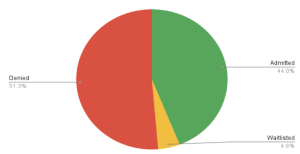The diminished spread of power following Trump’s national emergency
February 22, 2019
The core of the constitution consists of three coequal branches of government that not only delineate the framework for our government, but also seek to prevent any one branch from becoming too powerful. In my opinion, President Trump attempted to distort the balance of power and overstep his role in the government last Friday with his declaration of a national emergency on the border with Mexico.
Trump took this step in order to obtain several billions of dollars that Congress had not granted during Thursday’s spending package negotiations. Trump demanded $5.7 billion from Congress for the wall, but was forced to settle for $1.375 billion, inciting the President to sidestep the agreed upon compromise and invoke his emergency powers to fund the wall. According to White House officials, the emergency declaration would provide Trump with nearly $8 billion in total for the barricade.
Constitutionally, it is not in the President’s direct realm of influence to regulate spending. Congress is charged with appropriating spending and setting budget priorities, however, it now seems the president is assuming the role to drive his agenda. On top of this, Trump is diverting budget money from drug programs and construction projects for the military. Not only should the ethics of his decision to manipulate the budget be scrutinized, but we should also take into consideration the ramifications that might result from a breach in the systems of checks and balances that, for so long, have provided stability in our country.
Both the President and Congress had previously debated the issue surrounding the maximum funding for the wall and decided Trump’s demands could not be reached, spurring him to ignore an already settled decision in the hopes of prioritizing his own agenda.
This notion became evident following Trump’s statement in a recent press conference: “I didn’t need to do this, but I’d rather do it much faster,” he said, clarifying his intent to hasten the progress of his promised wall. In disclosing his lack of ‘need’ to issue the declaration, Trump admits the wall’s completion is not a national emergency but rather a mere plea to fund his pledged campaign. In challenging the constitutional balance of power, Trump is simply trying to energize his base.
Yet amidst the outrage, there are a few things to bear in mind: the President has the right to declare a national emergency. Though arguably unethical, Trump has not broken any laws in making this declaration and it is fully within the scope of his powers to make such a declaration as outlined by the National Emergencies Act.
Though it is within his powers (pending forthcoming lawsuits) to declare a national emergency, the danger lies in the precedent that this will set for future Presidents. Should Trump prevail and have the ability to siphon funding away from various military projects in the budget toward his wall, it may open the door for the National Emergencies Act (NEA) to become a tool for a President to control a portion of congressional spending. And this could be argued as a threat to our system of checks and balances since the President does not have the power to appropriate spending.
Though a threat exists, Congress does have measures it can take to thwart his attempt to fund the wall through the NEA. Through a congressional resolution followed by a majority vote in both houses, his declaration can be terminated. This means his power in invoking the NEA is not absolute or unchecked, but that does not mean his actions are justified.
Any attempt to bypass Congress when it comes to spending is a difficult concept to rationalize because we are not in a dire situation, like that of a financial depression or a large-scale war, that would allow for an expansion of Presidential power to save the nation. Because of this, we are left to rely upon a Republican-controlled Senate to safeguard against this attempt to expand power. And the precedent will be set in favor of the Executive branch should this declaration not be successfully challenged.
The budget debate was designed to alleviate and settle spending issues, yet with his latest stunt, Trump is nullifying a majority of the progress made on last Thursday. The issue here is that Congress already said they don’t want to allocate more money for the wall, so in essence, by declaring this a national emergency, he is circumventing Congress, and implying he is at liberty do as he sees fit despite the congressional settlement.
This is not the first time, however, that a president has seemingly over-extended his reach of power. President Harry Truman stretched his power during the Korean War, until the Supreme Court regulated his authority. This led to the National Emergencies Act of 1976 which codified, but not completely restricted, this breach of power. In the last few decades, other national emergencies have been declared, including George W. Bush’s decree following the attacks on September 11.
The key difference between Trump’s declaration and previously made national emergencies is that this is the first time a president has declared a crisis after Congress specifically denied a former request. Furthermore, most declarations of emergency were centered around foreign policy matters like trade regulations or the imposition of sanctions against foreign nations. Never was this act used to prop up a President’s domestic agenda that did not, as Trump admitted, demand immediate action.
So in response to the point that Trump is legally allowed to declare an emergency, if we look back at the precedent set by former Presidents, he is not using this power in an appropriate manner and in my opinion, something needs to be done to hinder his declaration.
Trump’s disregard for established balances of power can be further explored to understand the fundamental origins of power. In his commentary ‘Power/Knowledge’, Michel Foucault finds “that power is neither given, nor exchanged, nor recovered, but rather exercised, and that it only exists in action.” Foucault would agree that power is not placed in the individual but rather in the collective, though he suggests that the individual can be an instrument of power through their actions. In other words, power is attained through relationships or institutions and instilled into a society.
Though it could be said that the individual can maintain influence over a social institution, Foucault upholds that “these relations of power cannot themselves be established, consolidated nor implemented without the production, accumulation, circulation and functioning of a discourse.” A discourse Trump has disregarded in discounting the role of Congress with his declaration of a national emergency. In doing so, Trump presents himself as having more power than other branches of government which breaches the core values of a Democratic Republic government.
Since Trump’s power is rooted in our government institutions, he cannot rise above the institution itself, as long as the other branches are adhering to their constitutional responsibilities. However, the precedent that the national emergency declaration creates is a dangerous slope. A future president will be able to appropriate money to a specific agenda and take actions on his or her accord whenever Congress disagrees with a budget recommendation, tipping the balance of power. Of course, the vote to terminate a declaration of emergency, discussed earlier, is at the disposal of congressmen and women, but it would be much more difficult to enforce this power if Trump’s declaration is allowed to stand.
At its core, the issue centers around how much power the President should realistically have and how the other branches are to respond when those limits are pushed. Since Trump is acting within a system of democracy, he is limited in the actions he can take without resistance.
Despite Trump’s breach in the system of power, there still exists the pressing need for comprehensive immigration reform. It is true that we need to protect our borders. At the same time, we need to deal effectively with asylum seekers, who have a legal right to seek refuge if they are fleeing political persecution. I believe it is our duty to help those in need and we cannot turn away struggling refugees.
We need to protect “Dreamers,” those who came to the country as children who are no longer guaranteed sanctuary following Trump’s decision in 2017 to phase out the Dream Act. As a country rich with migrants, Trump’s latest demands have only added to the complexities of immigration. Yet, it seems Trump is trying to condense such far-reaching issues down to a wall, which objectively speaking, is not an effective overall solution.
Border security has never, and will never, be a straightforward political issue and the debate over the wall only serves to reinforce this argument. A physical barrier is not going to end the legitimate issues we have at our border, and the other branches of government need to exercise their power to check the authority of the President to avoid an erosion of our country’s foundational values and allow for a more comprehensive border solution.





